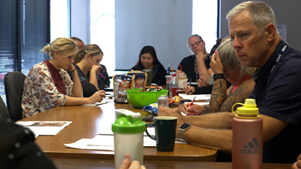Nebraska Progress Update – Addressing Secondary Traumatic Stress
March 2020
In December 2017, 53% of Nebraska child welfare workforce respondents had recently experienced elevated levels of secondary traumatic stress (STS) symptoms, according to a survey of 40% of the workforce conducted by the QIC-WD. STS can mimic the symptoms of Post-Traumatic Stress Disorder (PTSD) (Bride, 2007) such as nightmares, avoidance, sleep disruption, and irritability. A recent study, conducted in another jurisdiction, found that 37% of CPS workers reported at least moderate symptoms of STS (Baugerud, Vangbaek and Melinder, 2018), indicating Nebraska’s rate of STS was high relative to other child welfare workers. Since STS has been linked to low rates of staff satisfaction and retention, the Nebraska Division of Children and Family Services (CFS) partnered with the QIC-WD to address STS among frontline workers and supervisors.
The intervention they designed to address STS is called CFS Strong. It includes three components:
- Resilience Alliance (RA), developed by ACS-NYU Children’s Trauma Institute, to create a better and healthier work environment, and to help staff develop skills and behaviors that promote their physical and psychological well-being, thereby putting them in the position to do good child welfare work.
- Peer Support Groups (PSG), to reinforce the core RA concepts and support team cohesion. This portion of the intervention was created by CFS and the QIC-WD and is modeled after RA. Text messages were sent to all participants to remind participants of key concepts of CFS Strong throughout the implementation of RA and PSG.
- Restoring Resiliency Response (RRR) debriefings, created by the New York Society for the Prevention of Cruelty to Children (NYSPCC), in response to a traumatic event (such as the death of a child on the agency caseload). Sessions include integration of education, emotional expression, cognitive restructuring, and healing.
In early 2020, groups transitioned from formal, facilitator-led RA groups, into peer-led, Peer Support Groups (PSG). The CFS Strong implementation team created a PSG guidebook, following the same session structure as RA and designed to reinforce the following core components:
- Optimism/Positivism
- Collaboration
- Mastery
- Self-Awareness
- Self-Reflection
- Self-Care
The implementation team suggested that PSGs occur at least once per month for 60-90 minutes. Peer-led sessions could be organized by one or multiple group members and each group determined who led the session, how often and when they met, and what activities they wanted to do together. The PSG guidebook included suggested activities; however, teams were encouraged to be creative. Most groups are meeting for one hour a month, but some teams are meeting more often – one team opted to continue meeting weekly. Groups are scheduled to continue until summer 2020, or six months following the completion of RA. (The pandemic disrupted PSG meeting in spring 2020; some groups moved to virtual meetings and other groups paused their meetings, until they can resume face-to-face sessions.)
The final component of CFS Strong (RRR) was planned for spring/summer 2020 but has been delayed due to the COVID-19 pandemic. RRR will be implemented statewide based on need. The RRR debriefings will be led by a trained facilitator and delivered to small groups (1 – 8 CFSSs) after a traumatic event. Eligible traumatic events include:
- Child fatality
- Child experiencing severe physical or sexual abuse or neglect
- Homicide cases due to domestic violence
- Violence or threats of violence against a staff
- Other work-related acts or events of a similar serious nature
The evaluation of CFS Strong is on-going. The RA and PSG portions of CFS Strong will undergo rigorous evaluation, comparing outcomes of the teams randomly assigned to participate with those that did not. However, early measures show that participation rates were high and most participants had a generally positive experience. Ninety percent (90%) agreed or strongly agreed that the RA facilitators encouraged participation and 77% agreed or strongly agreed that the RA information was useful. There was mixed feedback on the involvement of supervisors in the groups and some participants felt the timing of the group session disrupted their workday or was not a good use of their time. Participant experience appears to vary based on the quality of their facilitators, trust amongst team members, and tenure of staff. Feedback from PSG has, generally, been quite positive so far. Anecdotal comments from the participants in both elements of the intervention include:
Resilience Alliance
- I am thankful for this opportunity to participate.
- I appreciate that [the facilitator] has done the CFS job so she understands the day to day stressors.
- This session helped me open up about what’s going on with a hard case I have and how it’s affecting me and I thought it was really helpful and I got a lot of good ideas I can try to help the situation. I’m thankful I had this session when I did and these people around me.
Peer Support Group
- The activity was really relevant to our work and the topic.
- Group participation was amazing and examples provided were very easy to connect with.
- I find that when seasoned workers admit their imperfection, this allows me to realize I am human no matter how experienced I become.
Additional perspectives from CFS Strong participants are documented in a recent video about CFS Strong.
CFS Strong was designed to build resiliency and help address trauma when it happens, recognizing it as a job hazard among the child welfare workforce. The implementation team hopes to roll out RRR in late 2020 to provide immediate support to staff when trauma occurs and demonstrate agency support for the challenging work CFSS do each day. The RRR portion of CFS Strong will undergo a process evaluation for a limited period of time. The results of the evaluation will be available in 2021 - 2022.
